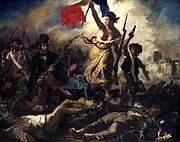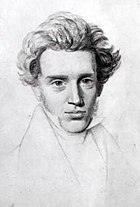Freedom (philosophy)
From Wikipedia, the free encyclopedia
| This article is missing citations or needs footnotes. Please help add inline citations to guard against copyright violations and factual inaccuracies. (May 2008) |
| Freedom |
| Concepts |
|---|
|
Freedom · Liberty |
| Freedom by area |
| Freedoms |
|
Assembly |


Freedom, or the idea of being free, is a broad concept that has been given numerous interpretations by philosophies and schools of thought. The protection of interpersonal freedom can be the object of a social and political investigation, while the metaphysical foundation of inner freedom is a philosophical and psychological question.
Contents |
[edit] Different Forms

- Outer or political freedom, or personal liberty, is the absence of outward restraints, with respect to speech, freedom of thought, religious practice,the press and the freedom to modify one's outward circumstances. (See Freedom (political))
- Inner freedom, i.e. the state of being an inwardly autonomous individual capable of exerting free will or freedom of choice within a given set of outward circumstances.
[edit] Interpretation
[edit] Innate state

In philosophy, freedom often ties in with the question of free will. The French philosopher Jean-Jacques Rousseau asserted that the condition of freedom was inherent to humanity, an inevitable facet of the possession of a soul and sapience, with the implication that all social interactions subsequent to birth imply a loss of freedom, voluntarily or involuntarily. He made the famous quote "Man is born free, but everywhere he is in chains". Libertarian philosophers have argued that all human beings are always free — Jean-Paul Sartre, for instance, famously claimed that humans are "condemned to be free" — because they always have a choice. Even an external authority can only threaten punishment after an action, not physically prevent a person from carrying out an action. At the other end of the spectrum, determinism claims that the future is inevitably determined by prior causes and freedom is an illusion.
[edit] Positive and negative freedom
The philosopher Isaiah Berlin drew an important distinction between "freedom from" (negative freedom) and "freedom to" (positive freedom). For example, freedom from oppression and freedom to develop one's potential. Both these types of freedom are in fact reflected in the Universal Declaration of Human Rights.
Freedom as the absence of restraint means unwilling to subjugate, lacking submission, or without forceful inequality.[citation needed] The achievement of this form of freedom depends upon a combination of the resistance of the individual (or group) and one's (their) environment; if one is in jail or even limited by a lack of resources, this person is free within their power and environment, but not free to defy reality. Natural laws restrict this form of freedom; for instance, no one is free to fly (though we may or may not be free to attempt to do so). Isaiah Berlin appears to call this kind of freedom "negative freedom" — an absence of obstacles put in the way of action (especially by other people). He distinguishes this from "positive freedom", which refers to one's power to make choices leading to action.
[edit] Inner autonomy
Freedom can also signify inner autonomy, or mastery over one's inner condition. This has several possible significances:[1]
- the ability to act in accordance with the dictates of reason;
- the ability to act in accordance with one's own true self or values;
- the ability to act in accordance with universal values (such as the True and the Good); and
- the ability to act independently of both the dictates of reason and the urges of desires, i.e. arbitrarily (autonomously).
Especially spiritually-oriented philosophers have considered freedom to be a positive achievement of human will rather than an inherent state granted at birth. Rudolf Steiner developed a philosophy of freedom based upon the development of situationally-sensitive ethical intuitions: "acting in freedom is acting out of a pure love of the deed as one intuits the moral concept implicit in the deed".[2] Similarly, E. F. Schumacher held that freedom is an inner condition, and that a human being cannot "have" freedom, but "can make it his aim to become free".[3] In this sense, freedom may also encompass the peaceful acceptance of reality. The theological question of freedom generally focuses on reconciling the experience or reality of inner freedom with the omnipotence of the divine. Freedom has also been used a rallying cry for revolution or rebellion.
In Hans Sachs' play Diogenes, the Greek philosopher says to Alexander the Great, whom he believes to be unfree: "You are my servants' servant". The philosopher states that he has conquered fear, lust, and anger - and is thus inwardly free - while Alexander still serves these masters - and despite his outward power has failed to achieve freedom; having conquered the world without, he has not mastered the world within. The self-mastery Sachs refers to here is dependent upon no one and nothing other than ourselves.
Notable 20th century individuals who have exemplified this form of freedom include Nelson Mandela, Rabbi Leo Baeck, Gandhi, Lech Wałęsa and Václav Havel.
[edit] The ontology of freedom
Freedom appears to be in conflict with scientific determinism. One solution to this is dualistic, suggesting that if everything material is subjective to deterministic causality, then for freedom to exist, it must be of a fundamentally different substantial nature than material existence.
If, on the other hand, freedom does not exist, then our subjective experience of freedom - and thus our responsibility for our own actions - is an illusion. Thus, determinism can lead to the claim that nobody is responsible for anything, and materialism may also put into question concepts of ethics and guilt.
[edit] See also
- Freedom (political)
- Anarchism
- Libertarianism
- Golden Freedom
- Liberty
- Anarchy
- Christian anarchism
- Christian libertarianism
- Parametric determinism
- List of indices of freedom
- John Locke
- Leo Strauss
- Inner peace
- Self-ownership
- Philosophy of Freedom
[edit] References
- ^ Wolf, Susan, Freedom Within Reason
- ^ Robert McDermott, The Essential Steiner, ISBN 00606553450, p. 43
- ^ E. F. Schumacher, Guide for the Perplexed, ISBN 0060906111, pp. 29f
[edit] Bibliography
- Aristotle, The Nicomachean Ethics, Book III.
- Augustine (Saint), On Free Will.
- Hobbes, Thomas, Of Liberty and Necessity.
- Hume, David, An Enquiry Concerning Human Understanding.
- Mill, John Stuart, On Liberty.
- Plato, The Republic.
- Schiller, Friedrich, Letters upon the Aesthetic Education of Man. ISBN 1-4191-3003-X
- Wolf, Susan, Freedom Within Reason, Oxford: 1990.
- Berlin, Isaiah, Four Essays on Liberty. London: Oxford University Press, 1969.
[edit] External links
| Wikiquote has a collection of quotations related to: freedom |
- Sovereignty and Freedom
- Non-Freedom - an article about the concept of non-freedom (in german), Ich denke,dass ich frei bin, in Sic et Non
- Free Will article from Catholic Encyclopedia


